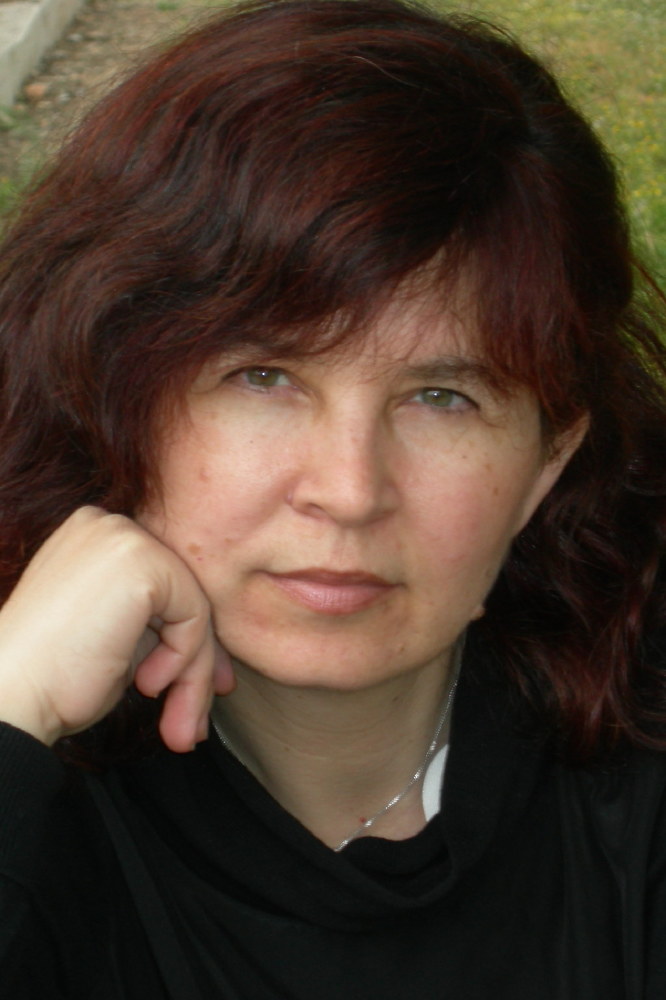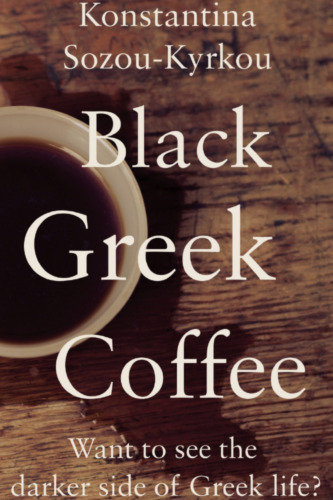
Konstantina Sozou-Kyrkou

Black Greek Coffee is a collection of 23 short stories, most of which are set in rural 20th century Greece. They are the outcome of both indulgence and hard work as I felt I had to produce interesting storylines that would amuse and exert some kind of social criticism while at the same time struggling with finding the right words, understanding the nuances of the English language (which is not my native one), the latter being a life-long endeavour for me. If it is true what they say that an author must write only about what she/he’d like to read then I think I have done just that as I still get goose pimples when reading some of my stories, like ‘The Rats’ or ‘Spoiled’ for example. There is great variety in theme and tone, each story introducing the reader to a different microcosm and its people’s concerns. The only story belonging to the supernatural genre is ‘I’ll bring her back’, which is based on a 16th century folk song set in Asia Minor entitled ‘A mother of 9 sons’, which is very atmospheric.
Why did you decide to write a collection of short stories rather than a novel?
It all started at Lancaster University, where I was doing my MA in Creative Writing. The tutor suggested I tried to hone my skills through shorter pieces rather than a longer one. I had written some short stories before as part of a creative writing course towards my BA(Hons) in Literature with the Open University, which were praised and offered me a distinction. That and the fact that I had already fallen in love with the short form, the density and the rhythm poems can have, the challenge to shape up a small world in a few, carefully chosen words galvanized me into pursuing the form.
Tell us about your inspiration behind the stories.
Most stories are based on true incidents, with the necessary tweaks in the plot of course to make them more coherent or exciting. I usually write about people I know. I’m inspired by their personalities and their life stories. My grandparents, my parents, my husband, my kids, neighbours and villagers all feature in the stories. For me, writing is exposing truths, ‘cauterizing’ realities, with a further aspiration to teach through the disclosure of prejudices, egotism, ignorance, fears and misconceptions that blur our vision.
Why was it important to you to bring voices to those who perhaps couldn’t bring themselves to tell these stories?
I grew up in a patriarchal home with a very despotic father, who, although he loved his family very much, he wanted to control everything., from the orders he’d made to stock his grocery store to the way his kids practiced learning the times table or even the way forks were placed on the table. There were often outbursts of anger with a lot of door slamming and dish smashing. Several of my childhood friends faced similar circumstances at home. It’s not that I am the spokesperson for my mother or all those oppressed women in my village, but I really felt I had to communicate the absurdity of the situation, highlight the ominous echoes such male dominated societies have on their less privileged members like women and children. On the whole, people who are victims of either their own bias or of repressive systems and traditions or even religion should be heard so that mistakes are not repeated and pain is alleviated.
How much has your qualification in creative writing helped you to write this book?
I first acquired the nuts and bolts of the craft at the courses I did with the Open University, where I had a wonderful teacher, Melissa Bailey. I have learnt so much from her and I think this was the first time I really evolved as a short story writer. At Lancaster University the tutor concentrated on a more theoretical aspect of literature and creative writing, her comments often being cryptic and laconic. I certainly developed as a writer under her guidance but not as much as I expected. Nevertheless, I had some fabulous course mates there who supported and encouraged me throughout my studies, most of who are published authors, whose work I admire. The MA taught me how to look at my work in a more objective, critical eye and how not to be afraid to ‘kill my darlings’ when necessary. I have also learnt that reading a lot is indispensable to a writer, from Shakespeare to a comic book or a brochure, anything that comes to hand.
Your stories have been published in many literary magazines. What has been your most memorable experience?
I should have said the story ‘My Pappous and his G43’ that was published in Tincture Journal Issue Three and which earned me my first 30 Australian dollars, but no. I was over the moon when I won in the competition the Fine Line Editorial Consultancy had organized with my story ‘Spoiled’ (the first to have been published). There were over 2,000 entries and only 23 were anthologized, one of which was mine. I was also delighted when the editor of The Missing Slate told me that my story ‘Freedom and Democracy’ was nominated for the Pushcart Prize 2013.
What is next for you?
I am wading through a novel set here in Greece in the years of the Generals’ coup. It is the story of two teenage sisters, how they deal with the chronic illness of one of them and their parents’ tyrannical behaviour, who reflect (and uphold) the dictatorial regime in Greece at the time. I know different skills to short story writing need to be applied here and I am not sure how I can manage. On the other hand, I might focus on another short story collection instead. Whatever works best.

